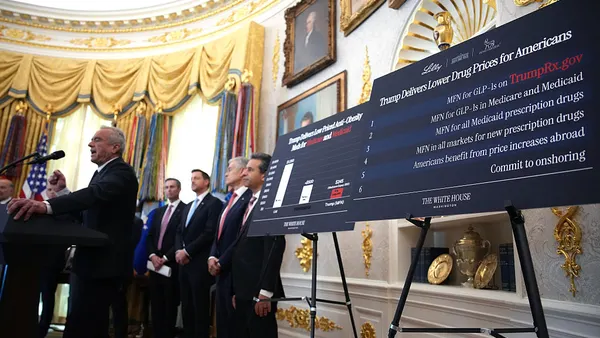24 September 2008 VIEW on Marketing CUSTOMERCENTRIC MARKETING Patient adherence is an area that pharmaceutical marketers struggle with on a daily basis. Despite best efforts, many patients do not take their medications as directed. In fact, no therapeutic category is immune — all suffer from this issue (NDC Health Information Systems). Nonadherence has many consequences, including annual pharmaceutical industry revenue loss of an estimated $30 billion (Eularis). In addition, nonadherence results in an estimated 125,000 deaths per year (Osterberg — NEJM. 2005:353:487), and up to 69% of medication related hospital admissions in the United States (Verispan). It is clear that improving patient adherence would have a number of positive outcomes. Adherence: The PhysicianPatient Equation Adherence can be examined, and addressed, from both sides of the healthcare equation: physician and patient. Professional interventions have focused on putting systems into place to help physicians get patients their medication in a more efficient and effective manner. Traditionally, on the patient side, marketers have looked toward theories, such as the behavior modification model, to determine ways to impact patient adherence. However, the best adherence interventions currently move the needle only 4%11% (NDC Health Information Systems). Therefore, current practices are just not enough to deal with this important problem. The Importance of PhysicianPatient Interactions One of the areas that marketers are beginning to look toward to better impact adherence is the dialogue between the physician and the patient. It is at this moment that the physician prescribes a medication, and provides the patient with the foundation for when, how, and why the medication should be taken. It is also when a discussion of potential side effects should occur. During followup visits, physicians can ask patients specific questions to surface nonadherence; they can also address specific barriers that patients raise. In short, the physician patient dialogue has a profound impact on patient adherence — and should be studied to identify problems and develop solutions. Assessing Dialogue Over Time The first step to leveraging physicianpatient dialogue to impact adherence is to understand what actually happens during interactions between physicians and patients — by seeing it happen. However, seeing just one encounter between a physician and a patient is simply not enough. Instead, it is through a longitudinal approach, capturing the same physician and patient having a series of dialogues with one another, over a longer period of time, that we can begin to understand what elements of the discussion drive patients to be more or less adherent. The next step in the process is to identify the successful moments, as well as the breakdowns in the conversation. Pharmaceutical marketers can address these dialogue based gaps though education. These solutions depend on a variety of factors, including the nature of the category. The best efforts always have both a physician and patient component, to simultaneously bring these two parties together so that they can have a more fruitful conversation. For example, we can model an appropriate adherence conversation for physicians and patients, giving them something to aspire to when they have a dialogue about medication and behavior. Seeing Change Solutions for a more productive dialogue need not be based in the actual dialogue — inoffice tools, administrated before the visit takes place, can create time and space for a more detailed discussion — and patient programs can supplement the office based communication. Solutions can be tested in real world practices to determine their effectiveness. It is time to challenge ourselves to consider the impact of the physicianpatient dialogue on adherence. Through studying it, we can more deeply understand the current adherence conversation. Then we can specifically impact it, through discrete interventions, to see change over time. We can create an adherence conversation that helps to improve patient outcomes. MBS/Vox MBS / VOX, part of CommonHealth, is a research based consultancy specializing in the physician patient dialogue. For more information, visit commonhealth.com/mbsvox.
An article from


Focusing on the Physician-Patient Dialogue
Filed Under:
Commercialization










